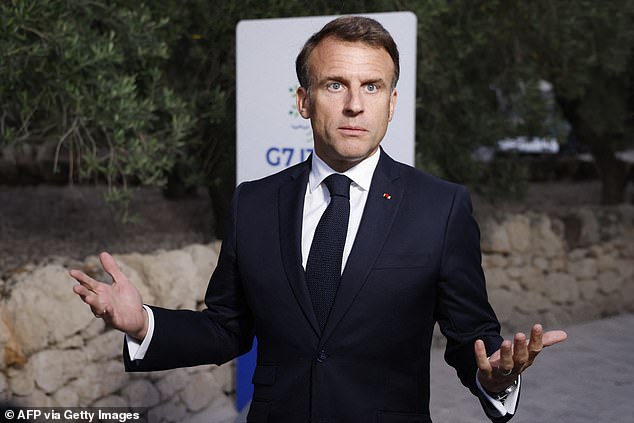Drinking champagne at the Elysée Palace has become a May ritual for the princes of high finance. Among European leaders, President Emmanuel Macron, a former Rothschild banker, has worked hardest for Paris to displace the City of London as the continent’s financial center in the post-Brexit era.
Good wining and dining has been supported by extensive regulatory reforms designed to showcase France’s winning ways as a financial centre.
The annual “Choose France” summits have achieved notable successes. Morgan Stanley has tripled the number of its Paris-based staff to 450 and foreign banks, including First Abu Dhabi and Nigeria’s Zenith Bank, have opened new branches amid much hubbub.
Bond markets are beginning to price in the prospect of Marine Le Pen’s National Rally winning the two-round parliamentary elections on June 30 and July 7.

Emmanuel Macron, a former Rothschild banker, has fought hard for Paris to displace the City of London as the continent’s financial center in the post-Brexit era.
But Macron’s offensive appears to be in danger. Liz Truss may have fatally undermined confidence in the Conservatives’ economic competence. But their chaos in global markets will come to naught if Marine Le Pen’s National Rally (RN) wins the two-round parliamentary elections on June 30 and July 7.
It may be too early for the City, which has maintained its lead in most areas of finance, to declare victory over its potential rival. However, if there was a French word for schadenfreude, you couldn’t blame the inhabitants of Square Mile for enjoying the moment.
Bond markets are beginning to price in the prospect of a far-right victory that upends Macron’s ability to govern from the center.
Imagine how markets would react to the election of Jordan Bardella, an unknown 28-year-old, as prime minister with plans to cut taxes, rebel against Europe’s costly climate change agenda and declare war on immigration. All this would be quite alarming if France were not already a budgetary basket case.
Amid temporary triumphs such as the view that the value of Paris Stock Exchange shares surpassed those of the London Stock Exchange (now the other way around), little attention has been paid to the underbelly of Macron’s government.
Whoever dominates policymaking after the election, and in the run-up to the next presidential election in 2027 (when Macron cannot stand), will have to deal with a bloated budget deficit and a level of debt that no UK government , whatever your political tone. , he would accept it. Paris will undoubtedly put on an elegant spectacle for the Olympic Games. Even the ramshackle Champs-Elysées is getting a makeover with a new LVMH emporium. But a budget horror show could still ruin the party. Last year the budget deficit was £147bn, more than 5 per cent of national output. France has one of the highest debt loads in Europe, £2.1 trillion or 111 per cent of output (much higher than the UK, which the Office for Budget Responsibility says will peak at 93.2 per cent). cent in 2028-29).
The yield on French government bonds has jumped to 3.1 percent, which is the highest level since 2012. The gap with German bonds – the gold standard in the eurozone – has increased to 0.7 percent.
The market fear is that if Le Pen wins the majority, the debt-to-output ratio will surely skyrocket. Any hope of meeting the 4.5 percent target set for 2027 would be gone. Even before the RN threat emerged, the IMF was warning that the economic assumptions made by Macron’s government are “somewhat optimistic.”
France is an important trading partner for Britain and its cooperation on immigration will be vital for the next UK government. It is not in our national interest to see French politics in crisis and its economy buried under the arrival of public and private debt.
However, it is difficult to feel sympathy for a country that tried to make economic and financial life as difficult as possible for ‘la perfide Albion’ after Britain had the temerity to leave the EU.


